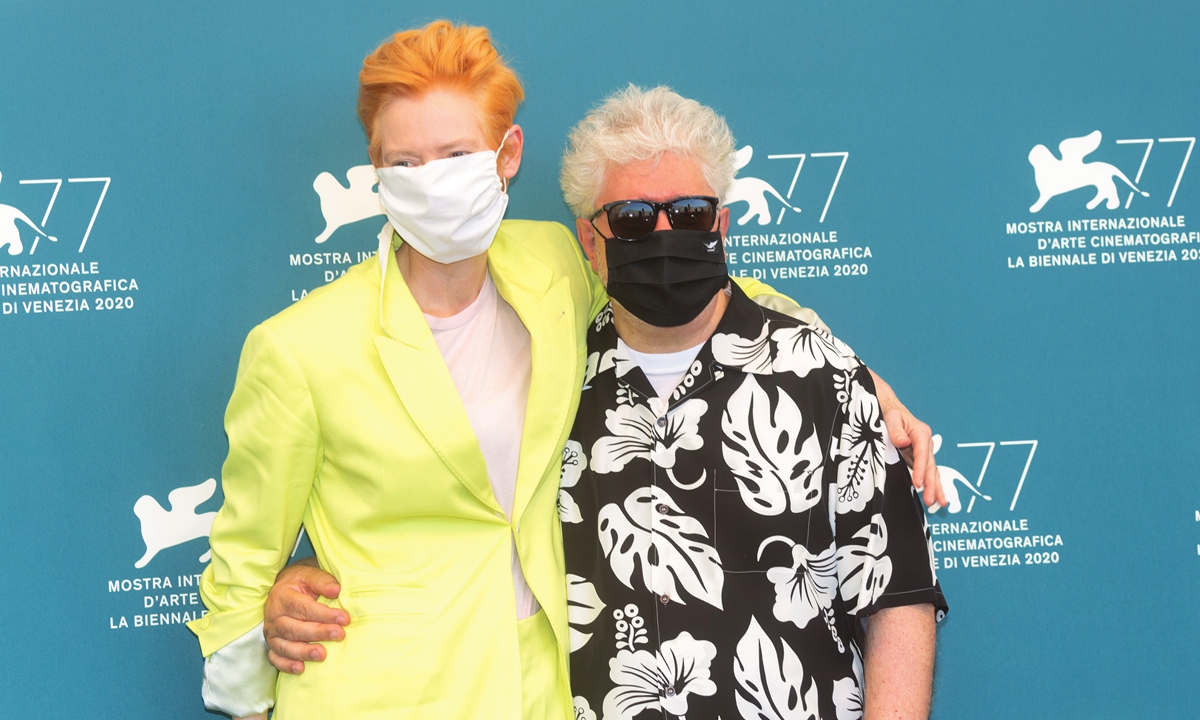No Hollywood ending for
Source: AFP Published: 2020/9/9 20:53:40

Actress Tilda Swinton (left) and Pedro Almodovar wear face masks during the 77th Venice film festival in Italy on September 3. Photo: IC
It's been a bad year for Venice.
In November, the highest tides in over 50 years left it submerged - the famous Italian lagoon city drenched, despondent and economically devastated.
Fast forward to February when the surrounding region, Veneto, saw Italy's first death from coronavirus - an epidemic that went on to kill over 35,000 people in the country.
Finally in September, the opening of the prestigious Venice film festival on September 2 was trumpeted as a sign of hope and renewal for the beloved yet beleaguered city.
But one week into the world-renowned "Mostra del Cinema" on the beachfront Lido, a 20-minute boat ride from Venice, many Venetians say there is still little to celebrate.
"Nothing has changed much," said Francesca, a tour operator manning a stand on the Venice waterfront who declined to give her last name.
For those locals accustomed to the estimated 30 million tourists who visit each year, the city feels empty, she said.
Visibly missing are visitors from the US and China, among other countries, who are still prohibited from traveling to the country.
Although visitors now outnumber pigeons and seagulls in Saint Mark's Square, and hotels are at 40 to 50 percent capacity, according to the mayor, the city has not yet hit its stride.
About a third of shops lining Saint Mark's Square were closed on Tuesday, as a few hundred tourists meandered around, enjoying the sunny weather.
Venetians also point out that those who attend the festival don't necessarily move outside their film industry bubble on the Lido.
"People come but it's not like people come to buy fish," said Andrea Dei Rossi, a seller inside the Mercato di Rialto, whose fish market has been in operation since the 11th century.
'A matter of image'
The festival, now in its 77th year, is a scaled-down version amid ongoing travel restrictions preventing many stars, filmmakers and industry executives from attending.
But restaurants, bars and other businesses on the Lido are enjoying at least a temporary boost with the arrival of the film crowd.
One waitress, Betelehem Pilastro, described the festival as a yearly "adventure" that "gives so much work to so many people."
Others are more sceptical, like water taxi driver Walter, who asked his last name not be used.
"There are hardly any films, just some Italian productions. It's a political festival that had to happen no matter what, even without content, to show that Venice is alive," he said. "I consider this festival just a matter of image."
Rent is due
The Serenissima, as the floating city of Venice is called in Italian, is home to a mere 50,000 residents who lament the city's depopulation, the worsening annual flooding, and the mass tourism threatening their environmentally fragile city.
The infamous acqua alta, or periodic high water, hit 187 centimeters in November, the highest level since 1966.
The city declared a state of emergency as shops, homes and over 50 churches were inundated with water, causing millions of dollars in damages and a collapse in tourism.
Just as the city was digging itself out, coronavirus struck.
Shopkeeper Lumine Vanda said Venetians are aware they're not alone in dealing with the difficult economic repercussions from coronavirus.
Still, the insecurity felt today by locals was worse than anything experienced in her lifetime, said the 75-year-old.
In March, Vanda's landlords cut by half the 5,000 euro ($5900) rent she pays for her artisanal shoe and handbag shop on the Rialto Bridge. But that discount will run out at the end of the year.
"In January they'll ask for five months rent," said Vanda.
"How will we do that?"
Newspaper headline: Difficult times